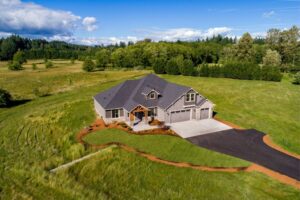There are important checks and research you should conduct while looking for a piece of land on which to build a house, both before and after you buy the property. In order to prevent the land you purchase from being a major hassle for you to prepare for your new home, we will go through some below.
1. ANALYZE THE LAND ACCURATELY AND CONDUCT A LAND SURVEY
Making sure you are not trapped with a piece of land that quickly causes problems and expensive additional fees is helpful when purchasing land for a house. Similar to a home inspection before buying a house, it’s crucial to complete a land survey or land inspection before buying land to understand the specifics and history of the property. For any permits required for building and utility access, a site appraisal is often also essential. Engage a site assessor or land surveyor who is licensed. Understanding the property lines and boundaries of the piece of land can be helped by a land surveyor. They can tell you what features, such as trees, sidewalks, and other elements that are located within the property line and what might be encroaching on the land, such as driveways, fences, etc., are included in the land that is being sold. A surveyor can also assist in figuring out what is feasible on the property based on its topography and intended use—the construction of a new house. Surveyors are also familiar with zoning regulations and building restrictions, which can help you determine the possibilities and boundaries of your home build.
Check out these land surveryors in Virginia and North Carolina!
2. ASSESS THE LAND’S UTILITY ACCESSIBILITY BY LOOKING FOR POWER, SEWER, AND WATER ACCESS
Consider whether the land parcel has access to power, water, and sewage before making your land purchase. It is advisable to not assume that since you are in a city or county, you will have access to all of these things. Before making a purchase, do some research to learn about the property’s utilities access. Ask the land seller or the real estate agent if there is access to public water. If there is public water access, you should get in touch with the water provider to find out how to connect to the water line and familiarize yourself with the requirements. This would entail being aware of the rules and licenses required to connect to the water line. It is useful to check to see whether there is a community well nearby if there is no public water supply. After that, you would speak with the well’s entity to learn how to connect to it and all of the steps involved in doing so. If neither public water nor well access is available, it might be necessary—and expensive—to dig your own well.
To find out if a sewer system is available or if a septic system is required, you can also check the availability of sewer access. It is likely that there will be a sewer system if there is public water, but it is preferable to know before you buy a piece of land. If a sewer system is available, ask a plumber or the sewer system’s regulatory body what steps must be taken to connect to it. A septic system may be necessary if the property uses a well for its water supply. Having a septic system installed typically necessitates permits and may limit the location of your home on the property.
Checking other connections and power access is also recommended. Most of the time, power access will be available in any crowded place. To learn about the policies of the power company and what is necessary to connect to the power line, however, contact the nearby power source.
You can avoid these access issues and save time and money by purchasing land that already has utilities installed. Knowledge of the potential and accessibility of the land is beneficial.
Zoning Departments Contact Numbers:
Shenandoah County, Virginia +1 (540) 459-6185
Davidson County, North Carolina +1 (704) 892-7592
3. CONSULT THE LOCAL GOVERNING BODY FOR SUBDIVISION AND ZONING LAWS
Inquire with the local government about the zoning regulations and whether the property is part of a certain subdivision. Applying for building and zoning permits is the first step after purchasing a piece of land for your house. The earlier this process is started, the better. Building and zoning permits might take some time, and you might need permits for utility access as well.
Zoning Departments Contact Numbers:
Shenandoah County, Virginia +1 (540) 459-6185
Davidson County, North Carolina +1 (704) 892-7592
4. CREATE CLEAR LAND EXPECTATIONS
It could be time to select a homebuilder and think about the procedures of building a new house once you have done your research and have started the process of applying for building and utility permits. When deciding what you would want to have built on the property and how you will finance your project, it might be good to include your homebuilder in the process at this stage. Check out our guide to find the ideal house builder for you. then determine how that home builder fits into the land clearance procedure. Does the property need to be cleared before construction on the house can start, or can the builder help? Take into account the advantages of collaborating with your homebuilder and what they can provide for you to facilitate the land preparation process.
5. MAKE A STRATEGY FOR ENGAGING EXPERTS
You will need to evaluate how to clear the land from the research and information you now have access to based on the house plan you have chosen and whether the homebuilder is involved in the land clearing process. Make a plan for hiring professionals to remove trees, brush, and existing structures while taking zoning and utility access into account. Utility companies will need to establish access to utility lines, and you’ll need to hire a land clearing or land preparation contractor.
It can be overwhelming to create your ideal home, but it’s worth it in the end!
Building your dream home is an investment in your future and a chance to design an environment that is entirely yours. Many things will need to be planned for, such as where to place all of your furniture and what color paint you want in each room.
Although it can be very rewarding, building a home is also expensive and time-consuming. It’s crucial to comprehend your financial possibilities and collaborate together with skilled architects, engineers, and builders.
Prioritizing your objectives for the house and making an idea book with examples of what you want in each room are good places to start the process. If you take care of everything up front before starting construction, you won’t need to make last-minute adjustments that might end up costing more or taking longer than anticipated.
Check out these beautiful properties for sale in Virginia and North Carolina where you can build your tiny house!





